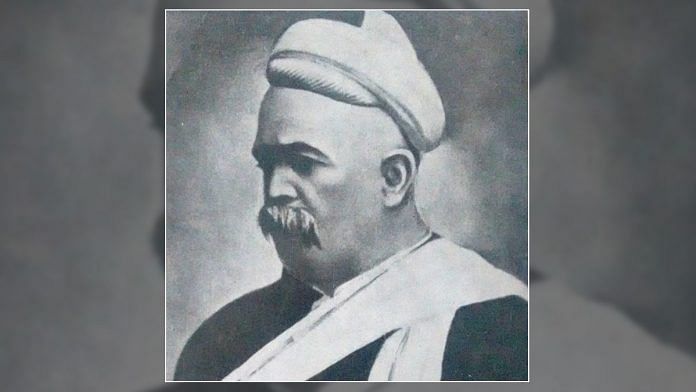New Delhi: “I propose to draw my materials from the Mohammedan philosophers and travelers who visited India both before and after the Mohammedan conquest changed the face of the country. Owing to the absence of the historic instinct among our people, we have necessarily to depend upon the testimony of foreign historians. That testimony is, however, unexceptional because it was for the most part given before the Mohammedan domination had effected the separation which distinguishes the old India of the past from the modern India in which we are now living.”
Mahadev Govind Ranade delivered this speech before the Indian Social Conference in Lucknow in 1900. His understanding of Indian history illustrated that he was always wary of the dangers of a single story. Apart from being a noted historian, M.G. Ranade was also a judge. But these are just two disciplines in which he worked.
Born on 18 January, 1842 in Niphad, Maharashtra, Ranade went on to be part of the first batch of then newly established Bombay University. He was responsible for the introduction of vernacular languages in the university curriculum. In 1871, he was appointed as the Presidency magistrate of the Bombay Small Causes Court. By 1893, Ranade had become a judge of the Bombay High Court.
He was also appointed an instructor of history at Elphinstone College, Bombay. This opportunity sparked his interest in the history of Marathas. His passion for the subject resulted in him writing Rise of Maratha Power in 1900.
Ranade died on 16 January 1901 in Pune. On his 119th death anniversary, ThePrint explores Ranade’s life and his tireless work in economic and social reform.
The Congress connect
A founding member of the Congress, Ranade played a major role in shaping the party’s initial outlook towards reform. In 1887, he was a leading figure in the Indian Social Conference, which was a reform organisation associated with the Congress in its early years. In a book titled The Nationalist Movement: Indian Political Thought From Ranade To Bhave, author Donald Mackenzie Brown writes the “tendency of the Indian Congress to pursue the dual and sometimes incompatible objectives of reform and independence stemmed largely from Ranade’s outlook”.
He further states that Ranade was “convinced that the association of Britain and India was a fortunate one for both peoples, and he was certain that an increase in knowledge and understanding of the mutual problems of Indians and British would inevitably remove the worst sources of evil and friction”. His ‘patience and tolerance’ influenced the Congress and the Nationalist movement until the final call for Independence, and his contribution includes mentoring political leader Gopal Krishna Gokhale.
Ranade was also an early member of the Prarthana Samaj (Prayer Society), which attempted to revise and reform conservative Hindu traditions. Despite coming from an orthodox Chitpavan Brahmin family himself, he challenged the status quo. Ranade believed in improving the status of women and promoted the idea of widow remarriage. He also argued that men needed to speak up for women and other marginalised groups.
Also read: Birsa Munda — freedom fighter ‘Dharti Abba’ who championed tribal rights
Ranade, the economic reformer
Regarded as the ‘father of Indian economics’, Ranade believed that India’s excessive reliance on agriculture was at the root of its problems. For him, economic development meant prioritising industry and commerce over agriculture.
“Every nation which desires economical advance has to take care that its urban population bear an increasing ratio to its rural masses with every advance it seeks to make,” Ranade stated this during an address to the students of Deccan College. He emphasised on the term “retrograde movement”, according to which, from 1871 to 1891, the number of labourers involved in agriculture increased from 56 to 66 percent. However, the number of those in manufacturing and trade decreased from 30 to 21 percent
In a paper titled M.G. Ranade and the Indian system of political economy, by Robert Gallagher, it is stated that “the progress of ruralization in modern India means its rustication i.e., a loss of power, and intelligence, and self-dependence, and is a distinctly retrograde movement… every class of artisans, the Spinners, Weavers and the Dyers, the Oilsman, the paper-makers, the Silk and Sugar and Metal workers etc., who are unable to bear up against Western competition, resort to the land, leave the Towns and go into the Country, and are lost in the mass of helpless people who are unable to bear up against scarcity and famine.”
Gallagher avers that Ranade helped revive an independent school of “Indian Political Economy”, which was able to persevere into the 20th century. The prime metric of this school was understanding the “growth of population density” as one of the “principal metrics of economic well-being”.
Ranade was also key in delivering warnings to the British regarding India’s flailing economy, especially during the economic decline that Bombay districts suffered from 1871 to 1891. He proposed that “the government must take responsibility for providing credit to agriculture and manufacturers at a low rate of interest”. However, his proposals for reviving the economy were rejected by the British.
This was a time when Indian intellectuals found themselves at a difficult crossroads, one wherein they would wonder if they should appreciate what the British had delivered to India (such as a modern educational system, communication and trade through the railways) or agitate against them for what India had been deprived of (benefits of the railways and trade were going to the British instead).
Ranade’s protege, Gokhale observed that Ranade was “self-reflective” and had immense “self-control” when it came to the same. Ranade was extremely tolerant of all religions. Apart from being extremely cooperative, he firmly believed that everyone deserved a “common platform” for India.
Also read: Baba Amte — who broke social norms to knit an inclusive India




M G Ranade was also pioneer of social reform in Maharashtra, building upon the rich tradition of Saints he led Marathi people to the front position in terms social reform.